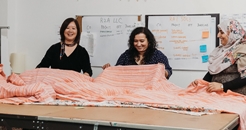 From textile waste to refugee livelihoods
From textile waste to refugee livelihoods
From an article on Reasons to be Cheerful
Ming-Ming Tung-Edelman, founder of Seattle-based Refugee Artisan Initiative discovered that refugee women have the highest unemployment rate and over 85% percent of the textile waste ends up in landfill.
She started the Refugee Artisan Initiative (RAI) in 2017 to address both figures. RAI hires immigrant and refugee women for liveable-wage jobs to sew for small-batch manufacturing, all while upcycling discarded or leftover materials. In five years the organization has diverted 5,000 pounds of textiles away from the landfill to their artisans, who have produced 120,000 total items. Thirty-seven women have earned roughly $500,000 in income, and eight have launched online shops through a partnership with Etsy.
Although working as a pharmacist, a fashion design course triggered Ming-Ming's interest in how the fashion industry could provide opportunities for women to gain financial independence. She set up RAI to help “knock down the barriers of the traditional workforce,” which she points out, does not accommodate women who have multiple children, do not speak English, are unable to drive or do not have a US-based education.
The glaring issue of textile waste also stuck with her, “It was an aha moment for me, thinking about how we could support these women learning new skills with excess textiles, and creating a circular economy through these jobs.”.
From RAI’s beginnings, Ming-Ming recruited refugee and immigrant women who had sewing skills and wanted to work from home. She works with each woman to determine how best to support them in becoming artisans and entrepreneurs.
The women can choose from three different paths toward self-sufficiency:
-
Work directly for the organization — mostly creating products for the RAI brand sold online.
-
Build skills to become independent contractors.
-
Guidance in starting their own microbusinesses.
Thanks to several partnerships with businesses, RAI gets excess textiles free of charge. One of the first emerged when Ming-Ming visited an Amazon warehouse that stores returned products; she simply asked if they planned to do anything with the now-unsellable bed sheets. These were then used by RAI to produce PPE in the pandemic.
Baseerah learned how to sew at age 12 in Afghanistan before coming to the US in 2003. RAI gave her technology support and extra fabrics, and she launched her own Etsy store, AsiyaDesignArt in 2022. If she needs equipment, she uses what’s available at the local RAI’s makerspace. The Etsy Uplift Initiative has been a big accelerator for RAI. It was started to bring more opportunity to artisan communities facing economic hardship, and RAI is one of several organizations that connected the online retailer with craftswomen from Afghanistan.
Starbucks donates burlap coffee sacks that RAI transforms into ornaments, stockings and totes for RAI to sell online. There’s also a new partnership with clothing retailer Tommy Bahama to create limited-edition products, like cocktail napkins and tote bags, from the company’s excess fabric. Those items will be sold inside Tommy Bahama stores.
In 2023, RAI’s goal is to hire at least one new artisan a month and open a new makerspace. The goal is to train 100 refugee and immigrant women, helping them secure employment either through RAI, their own businesses, or other companies.
Read the full article here.
Retweet about this article:
From an article on Reasons to be Cheerful, 05/04/2023